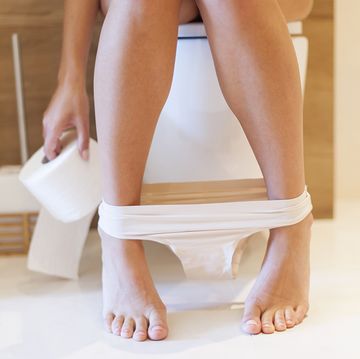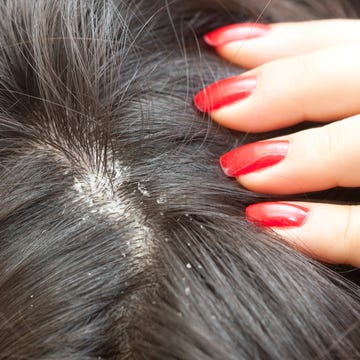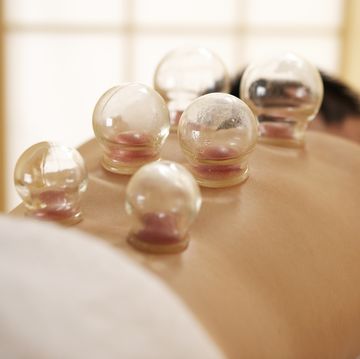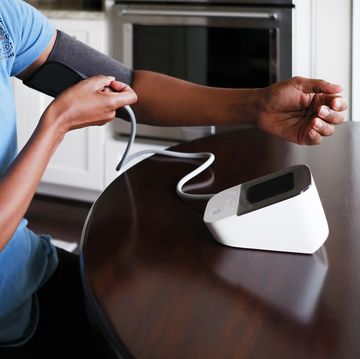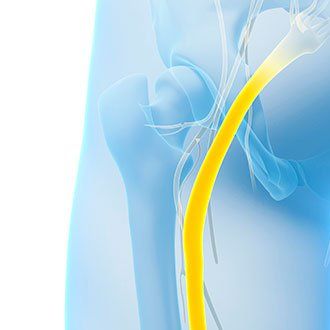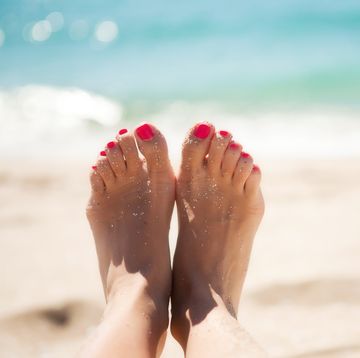Is it better to exercise for about 20 minutes every day, or 3 times a week for about an hour? What about eating nutritious foods—if you're craving a treat, should you cheat a little every day or indulge only on the weekends? If you’re wondering just how much your schedule impacts your health habits, we’ve got the answers.
Eating Junk Food
The question: Should you cheat a little bit every day or be disciplined on the weekdays and go wild on the weekends?
The answer: Allowing yourself a little bit of a "bad" food every day is a better option, says Joan Salge Blake, RD, LDN, a clinical associate professor at Boston University College of Health & Rehabilitation Sciences and a spokesperson for the Academy of Nutrition and Dietetics. "This puts you in control of the food, not the other way around. If you restrict eating a food to only once a week, it perpetuates the ‘all or nothing' mentality. So when you allow yourself to eat it, you binge on it like it's the last train out of town." Whatever your favorite treat is, portion out one serving or allow yourself one small bite each day to fulfill your craving without derailing your diet. (Hack your gut bacteria for easier-than-ever weight loss with The Good Gut Diet.)
MORE: 25 Best Diet Tips Of All Time
Drinking Alcohol
The question: What's better: Having one drink a day or binging on the weekends?
The answer: First of all, if you don't drink, there's no reason to start. But if you like to drink, it's much better to have up to one drink a day if you're a woman and up to two drinks per day if you're a man, rather than binging. "That way you don’t get a spike in insulin levels. Alcohol has a very high glycemic index and requires a lot of insulin to metabolize it," Mitchell Gaynor, MD, a clinical professor of medicine at Weill Cornell Medical College and the author of The Gene Therapy Plan. "If you binge on a regular basis, it can cause insulin insensitivity, which leads to diabetes.” Not to mention liver damage, cancer, heart disease and more. Keep in mind that "one drink,” according to the CDC, is equivalent to 12 ounces of beer (that's a can or bottle—a pint is 16 ounces), five ounces of wine, or 1.5-ounces (a shot) of 80-proof distilled spirits or liquor.
MORE: Are You A Binge Drinker Without Knowing It?
Sleeping
The question: Should you try to get the same amount each night, or is it okay to shortchange yourself on sleep Monday through Friday and catch up over the weekend?
The answer: "Binge sleeping is a terrible idea for two reasons. One, it will throw off your circadian rhythm," says Michael Breus, PhD, a sleep specialist in Scottsdale, Arizona, and the author of Good Night: The Sleep Doctor’s 4-week Program to Better Sleep and Better Health. This is troublesome because in the days that follow the binge, it will be harder for your body to know when it's time to wake up and when it's time to snooze. "Second of all, your body won’t feel good on this schedule," says Breus. "I tell all of my patients that if there’s only one thing that they can do, they should keep the same sleep schedule both during the week and on the weekends."
Having Sex
The question: Is it better to have a quickie every day or a lot of sex over the weekend?
The answer: The truth is, everyone has a different level of desire and a different schedule, so there's no easy answer. "As long as you're having it, that’s a good thing. Do it regularly, as it suits you," says Jennifer Berman, MD, a urologist in Los Angeles and co-author of Secrets of the Sexually Satisfied Woman: Ten Keys to Unlocking Ultimate Pleasure. "Trying to choreograph and control when and why dilutes the experience." Keep in mind that if you are the type who plans one marathon session a week every Saturday night, you may run into some obstacles. For one thing, that puts a lot of pressure on a couple. What if, come Saturday, you're tired and would rather just watch a movie? Plus: "Some people just don’t have the stamina or interest. There can also be friction and dryness issues," says Berman.
MORE: 8 Times It's Totally Normal To Have A Low Libido
Training Your Brain
The question: Is it better to do one crossword puzzle every day for 10 minutes or read a book for an hour over the weekend?
The answer: The jury is still out. "I don't think anyone could give you a clear answer with a basis in science," says Constantine Lyketsos, MD, director of the Memory and Alzheimer's Treatment Center at the Johns Hopkins Bayview Medical Center in Baltimore. But here's what we do know. The brain needs three types of stimulation to thrive: mental, physical, and social. "Since it's recommended to get at least about 3 hours of physical exercise each week, I'd recommend also getting at least 3 hours of mental exercise and 3 hours of social engagement each week, too," he says. Mental exercise could include reading, doing a crossword or Sudoku puzzle, studying a new language, learning an instrument, or using an online brain-training program like Lumosity.com. Physical exercise could include any moderate or vigorous cardio or weight training. And social engagement might mean hanging out with friends, going to church, or chatting with a sibling over the phone. The key is to mix things up and not do the same activities each week. "Because the brain is so complicated, if you just do one thing, you're stimulating and maintaining only a very small part of it. Variety maximizes the chances that you'll engage as many brain areas as possible," says Lyketsos.
Flossing
The question: Do you have to do it nightly, or can you do it once in a while for a longer period of time?
The answer: This may be hard to swallow, but you need to floss every night. How come? “The longer the plaque and food stays untouched, the greater the chance of gum disease and tooth decay," says Kourosh Maddahi, a dentist in Beverly Hills, California, and the author of Anti-Aging Dentistry. One thing that might speed up the often-dreaded process is using a floss pick (which has a handle), rather than traditional floss, which you string around your finger.
Changing Your Contacts
The question: Is it healthier for your eyes to use daily contact lenses, as opposed to lenses that you change biweekly or monthly?
The answer: Both options are perfectly fine to use, but if you wear biweekly or monthly lenses, make sure that you're cleaning them properly. "The 2-week and 4-week lenses can sometimes build up deposits, which can make the lenses uncomfortable to wear before it's time to change them. They need to be cleaned each night (rubbed with fresh solution), and not just taken out of the eyes and placed into the case. Compliance with this can be a problem," says Neeti B. Parikh, MD, an ophthalmologist at Montefiore Health System and an assistant professor at Albert Einstein College of Medicine in New York City. "If you can't keep up with the daily cleaning, or if you have allergies or dry eyes and the preservatives in the longer-wear lenses irritate your eyes, daily lenses are nice because you get new, sterile lenses every day."
MORE: 10 Things Your Breasts Say About Your Health
Exercising
The question: Is it better to exercise for 20 minutes daily or an hour 3 times a week?
The answer: "More frequent, shorter sessions are better for most people with general fitness goals (meaning nothing at the extremes, like bodybuilding or high-performance athletics)," says Jonathan Ross, a certified personal trainer in Bowie, Maryland, and the author of Abs Revealed. "That's because your body builds itself from your habits. Longer workouts a couple days a week tell your body that intense efforts are infrequent, and the result is a body adapted to how you spend most of your time—not exercising. More frequent yet shorter workout sessions can still be intense enough to make a difference, and the higher frequency makes your body adapt to that regularity." So try to make exercise an everyday activity, even if it's brief. It could be something as simple as going for a quick walk around the block over your lunch break, doing jumping jacks, push-ups, or crunches during the commercials of your favorite television show, or playing with your kids or your dog in the backyard. (Check out these 25 easy ways to fit in 10 minutes of exercise.)
MORE: 7 Things Your Hair Says About You
Washing Your Hair
The question: Is it better to wash your hair for a few quick minutes every day, or really suds up every few days?
The answer: In short, it depends on how much you sweat and how much product you put into your hair each day. "Some people may find it necessary to shampoo their hair every day due to excessive perspiration and hair product build-up. However, for most, shampooing hair every couple of days (2 or 3 times a week) will help preserve the health of the hair and scalp and help color last longer," says Jason Pritchard, a hairdresser in Tampa, Florida. "And you may actually have more ‘good hair days’ with a day-old style." So if you're able to, try letting your hair go a few days without a scrub.
Jane Bianchi is a writer and editor with more 13 years of experience specializing in health; she formerly worked as a health editor at Family Circle, and her work has appeared in Men’s Health, Women’s Health, Esquire, and more.




